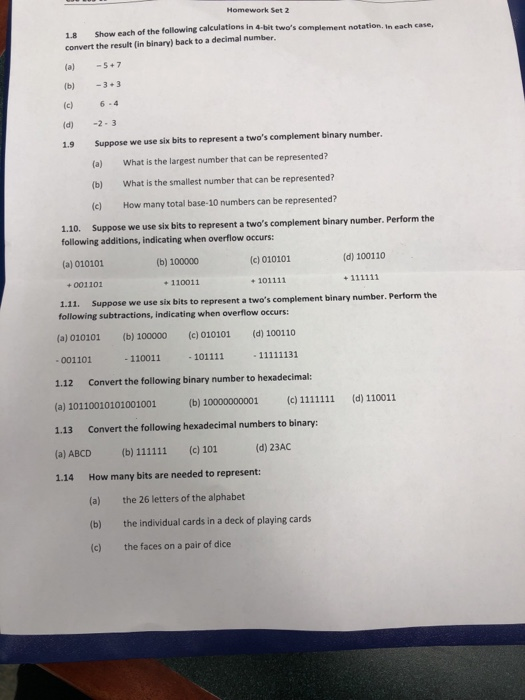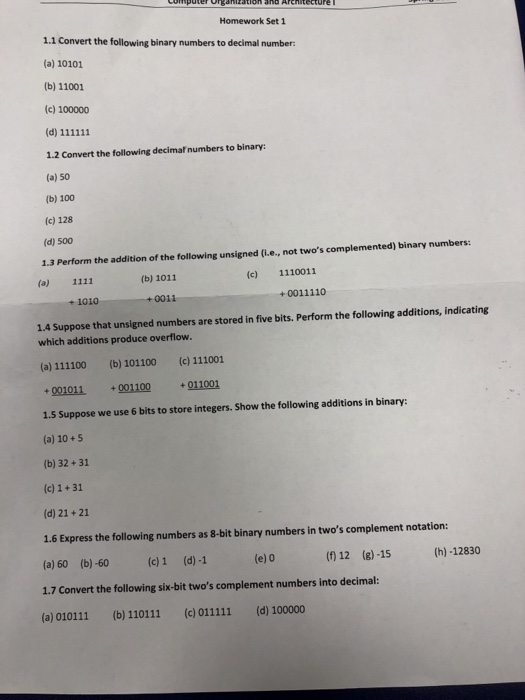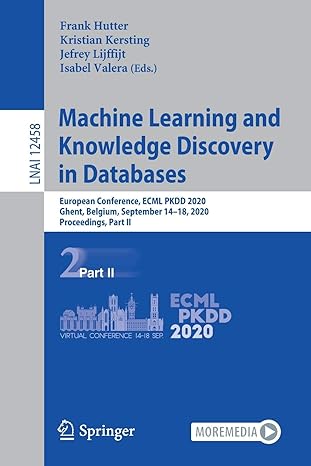Answered step by step
Verified Expert Solution
Question
1 Approved Answer
Computer architecture class hw Do both pages Homework Set 1 1.1 Convert the following binary numbers to decimal number (a) 10101 (b) 11001 (c) 100000
Computer architecture class hw 
Homework Set 1 1.1 Convert the following binary numbers to decimal number (a) 10101 (b) 11001 (c) 100000 1.2 Convert the following decimar numbers to binary (a) 50 b) 100 (c) 128 (d) 500 1.3 Perform the addition of the following unsigned (i.e., not two's complemented) binary numbers (a) 1111 (b) 1011 (c) 1110011 +1010 +0011 +0011110 1.4 Suppose that unsigned numbers are stored in five bits. Perform the following additions, indicating which additions produce overflow (a) 111100 (b) 101100 (c) 111001 001011+001100 011001 1.5 Suppose we use 6 bits to store integers. Show the following additions in binary: (a) 10+5 (b) 32+31 (c) 1+31 (d) 21+ 21 1.6 Express the following numbers as 8-bit binary numbers in two's complement notation (a) 60 (b)-60 (c)1 (d) -1 (e) o (0) 12 (8) -15 (h) -12830 1.7 Convert the following six-bit two's complement numbers into decimal: Homework Set 2 1.8 Show each of the following calculations in 4-bit two's convert the result (in binary) back to a decimal number (a) s+7 (b) 3+3 (c) 6-4 (d) -2 3 1.9 Suppose we use six bits to represent a two's complement binary number complement notation, In each case (a) What is the largest number that can be represented? (b) What is the smallest number that can be represented? (c) How many total base-10 numbers can be represented? 1.10. Suppose we use six bits to represent a two's complement binary number. Perform the following additions, indicating when overflow occurs (a) 010101 (b) 100000 (c) 010101 (d) 100110 +001101 *110011 * 101111 1.11. Suppo se we use six bits to represent a two's complement binary number. Perform the following subtractions, indicating when overflow occurs (a) 010101 (b) 100000 (c)010101 (d) 100110 001101 - 110011 - 101111 1.12 Convert the following binary number to hexadecimal: (a) 10110010101001001 1.13 Convert the following hexadecimal numbers to binary: b) 10000000001 (c) 1111111 (d) 110011 (d) 23AC How many bits are needed to represent: (a) (b) (c) 1.14 the 26 letters of the alphabet the individual cards in a deck of playing cards the faces on a pair of dice Do both pages 


Step by Step Solution
There are 3 Steps involved in it
Step: 1

Get Instant Access to Expert-Tailored Solutions
See step-by-step solutions with expert insights and AI powered tools for academic success
Step: 2

Step: 3

Ace Your Homework with AI
Get the answers you need in no time with our AI-driven, step-by-step assistance
Get Started


